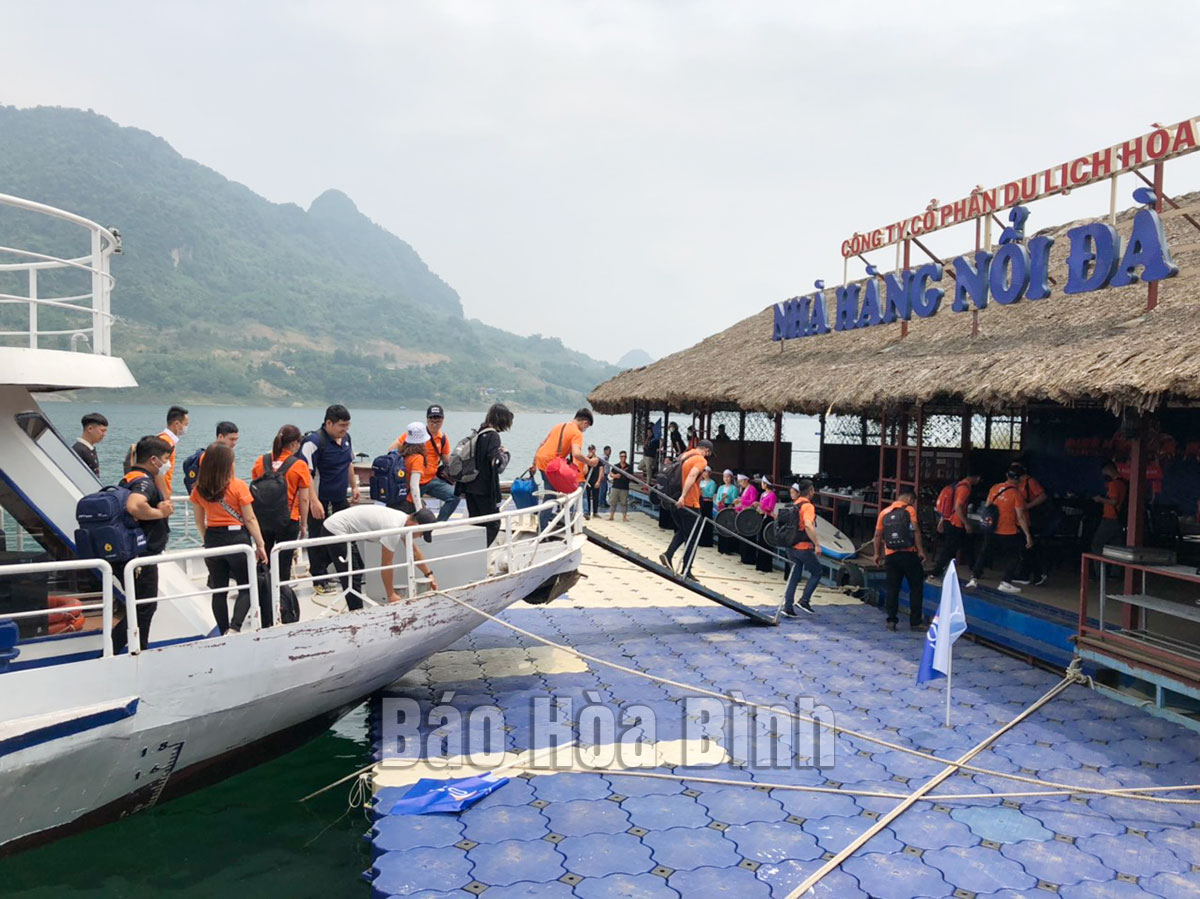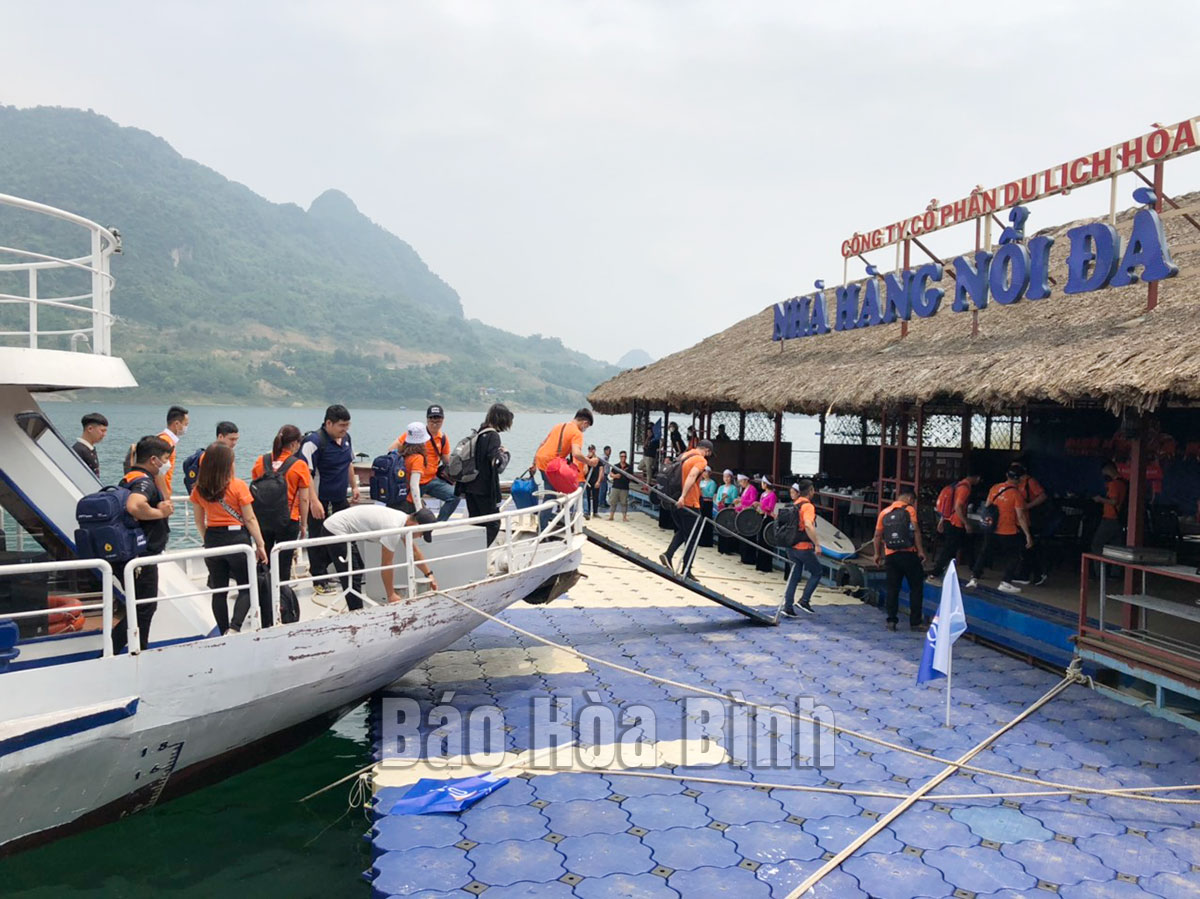
(HBO) – Suoi Hoa commune, formerly called Ngoi Hoa, in Tan Lac district is located in the core of the Hoa Binh Lake tourism zone. It is home to Ngoi Hoa Bay that stretches thousands of hectares and boasts beautiful natural landscapes, including a vast and tranquil lake area, which can charm anyone who loves to travel and explore.
Tourists visit Suoi Hoa commune of Tan Lac district.
Suoi Hoa has long been a memorable place for
visitors from far and wide who use to set foot here. Villages around Ngoi Hoa
Bay have beautiful and poetic natural landscapes, immense forests, attractive
caves and fresh climate change.
Among them, Ngoi village is home to pristine
caves with hidden charm. There are about 80 households here most of which
belong to the Muong ethnic group, whose traditional culture has still been
preserved in the current daily life and remains almost intact. This village was
recognised as a community-based tourism site of the Muong people by the Hoa
Binh provincial People’s Committee many years ago.
Located on the slope of Ba Mountain, Hoa Tien
Cave in Ngoi village is a mysterious and unique space urging travellers to come
to explore and experience. About 20 metres high and 50 metres wide, it features
countless stalagmites and stalactites of all sizes, along with crystal clear
ponds. When getting knocked gently, stalactites hanging down from the roof of the
cave release sounds like gongs.
Coming to Ngoi village, Ngoi Hoa Bay or Hoa Tien
Cave in March, tourists will have a chance to learn about the culture of the
Muong ethnic group, experience the daily life of hospitable residents and try
their specialty dishes such as grilled pork and fish, hill chicken and forest
bamboo shoots. They can also go sailing, fishing and jogging or climb mountain
to explore Hoa Tien Cave to admire sparkling stalagmites and stalactites in
various shapes there.
Summer, especially from May to August, is an
ideal time for activities on water on Hoa Binh Lake.
Meanwhile, the tranquility from September to
April makes this place a wonderful relaxation destination for holidaymakers.
Spending a night in the commune is also an experience worth a try since
tourists can enjoy the sunset and sunrise, especially cool and fresh winds
blowing from the lake on moonlight nights. They can also get up early, at 4am,
to join local people in pulling up square dip nets and wait for the sunrise.
Nguyen Bich Thuy, a visitor from Hanoi’s Tay Ho
district, said coming to Suoi Hoa commune, they learned about the traditional
culture of the Muong minority, tried the local simple life and met friendly
people. She expressed her belief that in the future, with more investment,
local destinations will become ideal places for those who want to escape from
the stressful and full-of-pressure life in urban areas./.
A diverse chain of eco-tourism and resort destinations concentrated in Hoa Binh city and the districts of Tan Lac, Da Bac, and Luong Son… Along with the launch of several key high-quality resort tourism projects, these developments have reshaped the landscape and enhanced the appeal of Hoa Binh as a travel destination.
Boasting diverse terrain, a mild climate, and rich natural resources, Cao Phong district is increasingly asserting its place on Vietnam’s tourism map, attracting both domestic and foreign visitors. The district is renowned for its stunning landscapes, majestic mountains, a crystal-clear hydropower lake, and the unique cultural identity of local ethnic groups.
With its pristine landscapes, unique cultural heritage of Muong ethnic minority, and an expanding range of visitor experiences, Tan Lac district of Hoa Binh has fast become a captivating destination for both domestic and international tourists.
Until now, Sung village in Cao Son commune, Da Bac district remains the only Dao ethnic community in Hoa Binh province to develop a community-based tourism model. Beyond its untouched natural landscapes, cultural identity serves as the cornerstone attraction for visitors.
Alongside the diverse cultural identities of the Kinh, Muong, Tay, Thai, Dao, and Mong ethnic people, Hoa Binh province is also renowned as the "capital" of the northwestern Vietnamese cuisine, offering unique and distinctive dishes. At festivals, during Lunar New Year (Tet), or on significant family or community occasions, special dishes are prepared, leaving a lasting impression on visitors.
A Phong Linh (Yellow Tabebuia) flower garden in Thang village, Thach Yen commune, Cao Phong district is currently in full bloom, drawing a large number of visitors.



